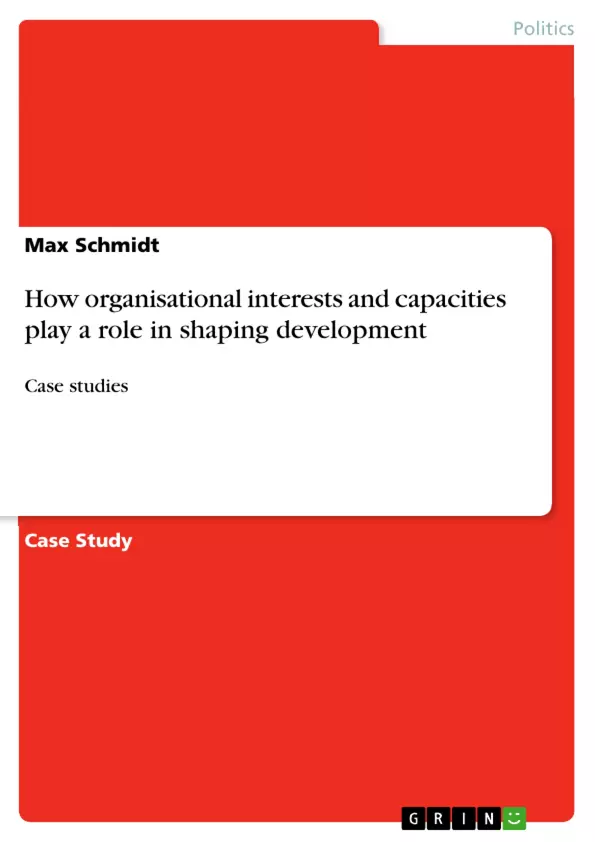Less attention, however, has been paid to the role of organisational interests and capacities for shaping development outcomes. In the following, their role as well as that of surrounding factors will be illuminated. It will be argued that comprehensive analyses of a development organisations behaviour-outcome-nexus has to rely on structural aspects, including contexts, trends, organisational logics and goals.
First of all, in order to understand the behaviour-outcome-nexus, one has to take a step back and shed light onto the structures in which these development organisations (DOs) operate. As it is frequently pointed out, the higher the number of (I)NGOs in a transnational sector such as development , the higher the (in)direct transaction costs. This includes, for example, costs related to selecting recipients, monitoring aid projects and collecting information and funds more generally. Consequently, and acting in both directions, the higher the transaction costs for a respective DO, the higher the uncertainties and competition.
Inhaltsverzeichnis (Table of Contents)
- Introduction
- The Behaviour-Outcome-Nexus in Development Organisations
- Structural Aspects
- Contexts and Trends
- Organisational Logics and Goals
- Development Outcomes and Organisational Capacities
Zielsetzung und Themenschwerpunkte (Objectives and Key Themes)
This essay aims to explore the complex relationship between organisational interests and capacities and the shaping of development outcomes. It focuses on the role of transnational development organisations (DOs) in influencing development processes, considering the multifaceted nature of the development sector and the increasing competition for resources.
- The influence of organisational interests and capacities on development outcomes.
- The impact of structural aspects, including contexts, trends, and organisational logics, on DO behaviour and outcomes.
- The role of transaction costs, fragmentation, and marketization in shaping the development sector.
- The concept of "development space" and its potential to explain development outcomes at the macro and micro levels.
- The importance of organisational capacities and their connection to intra- and extra-organisational logics.
Zusammenfassung der Kapitel (Chapter Summaries)
- Introduction: This chapter sets the stage for the essay by highlighting the growing complexity of the development sector and the increasing competition for resources. It introduces the concept of the behaviour-outcome-nexus and argues that understanding the role of organisational interests and capacities is crucial for explaining development outcomes.
- The Behaviour-Outcome-Nexus in Development Organisations: This chapter delves into the structural aspects that influence DO behaviour and outcomes. It discusses the impact of contexts, trends, and organisational logics on DO activities, highlighting the role of transaction costs, fragmentation, and marketization.
- Development Outcomes and Organisational Capacities: This chapter explores the relationship between development outcomes and organisational capacities. It examines the importance of organisational capacities and their connection to intra- and extra-organisational logics, emphasizing the concept of "development space" as a potential explanation for development outcomes at both the macro and micro levels.
Schlüsselwörter (Keywords)
This essay focuses on key concepts such as organisational interests, capacities, development outcomes, transnational development organisations (DOs), transaction costs, fragmentation, marketisation, development space, and organisational logics. It explores the influence of these factors on the development sector and the challenges faced by DOs in achieving their goals.
Frequently Asked Questions
How do organizational interests influence development outcomes?
Development organizations (DOs) are influenced by their own goals, internal logics, and the competitive environment, which can shape how aid is distributed and managed.
What are the transaction costs for NGOs in the development sector?
Transaction costs include expenses for selecting recipients, monitoring projects, and fundraising. Higher numbers of NGOs in a sector often lead to increased indirect costs and competition.
What is the "behaviour-outcome-nexus"?
It is the link between the internal structural aspects of an organization (like its logic and goals) and the actual development results it achieves in the field.
What is meant by the "development space"?
The development space refers to the conceptual and practical area where organizations operate, influenced by global trends, marketization, and fragmentation within the sector.
Why are organizational capacities crucial for success?
Capacities determine a DO's ability to handle uncertainty and competition. They are shaped by both internal management and external structural trends.
- Citar trabajo
- Max Schmidt (Autor), 2020, How organisational interests and capacities play a role in shaping development, Múnich, GRIN Verlag, https://www.grin.com/document/978882



